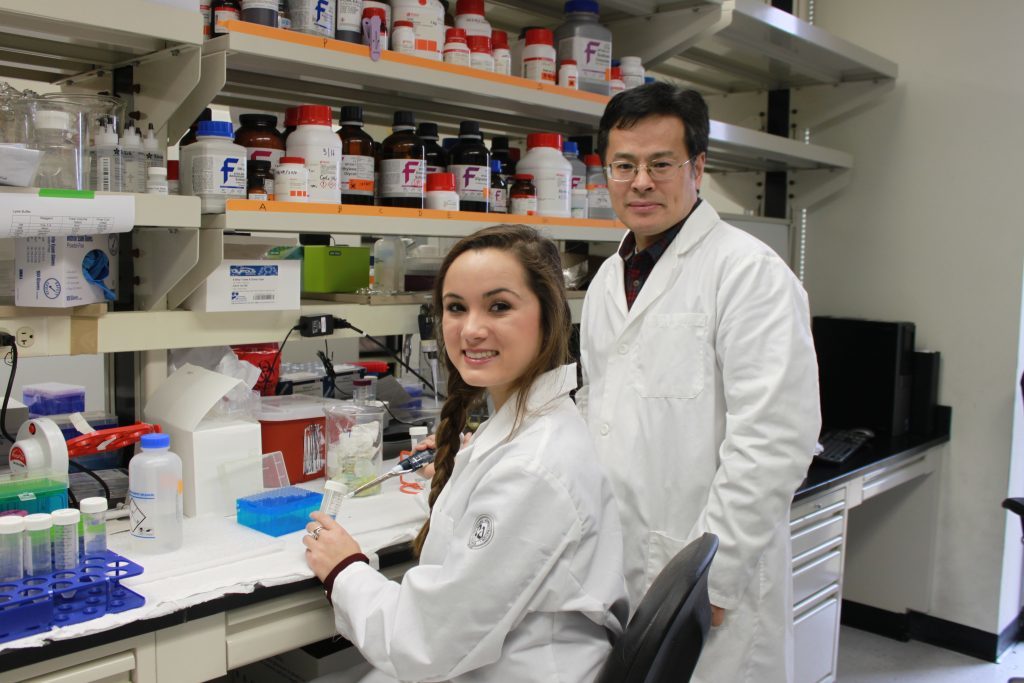
Doctor of Philosophy in Nutrition
The doctoral program in nutrition allows emphasis in the broad fields of basic, molecular nutrition or applied human nutrition. For instance, Ph.D. candidates in basic nutrition may perform research in the areas of nutritional biochemistry, physiology, immunology, and/or molecular biology, while applied nutrition candidates may be interested in clinical, community or international nutrition research. Students are required to complete the core curriculum in nutrition which includes courses in nutrition, biochemistry, physiology, and/or epidemiology and biostatistics.
Program Details
Students with a B.S. or M.S. in nutrition or related life science field are eligible for the program. In the fall of the first year, the students perform laboratory rotations and start their graduate coursework – this means students do not need to secure a graduate advisor before submitting an application to this program. The laboratory rotations provide an opportunity to evaluate suitable laboratory environments for their graduate research. It is anticipated that most students have decided on a research laboratory by the start of the second semester.
During the second and third semesters, students provide teaching assistance to undergraduate students to gain teaching skills. However, the main focus is on getting a research project started, with the assistance of the thesis advisor and three additional faculty, who form the thesis committee. This period is also the time when students will prepare for their preliminary examination, to be taken by fall of the third year.
The third, fourth and fifth year are dedicated to continuing and completing the thesis project, presenting data at conferences and publish the work, followed by the thesis defense. Generally, 4 to 5 years of study is required to complete 96 semester hours with a GPR of 3.0 or higher. The Ph.D. degree is awarded principally on demonstrated ability to conduct significant and original scientific research.
Our students are expected to present their research at national and international conferences and publish in established, high-impact peer-reviewed journals, and their teaching experience provides an additional valuable asset for future job opportunities.
Financial Support
Students accepted to the Nutrition Ph.D. program receive financial assistance through a Graduate Assistantship which includes tuition, fees, health insurance, and a competitive stipend. This financial support is granted regardless of financial need for at least 5 years. The stipend for the 2025-2026 academic year is $34,000 with the total 5-year financial package coming to approximately $230,000.
Application Deadline
- December 1
What Do I Need to Apply?
- Apply through the Texas A&M University GraduateCAS system
- Upload unofficial transcript with application
- Resume or Curriculum Vitae
- Statement of Purpose
- Three letters of recommendation, submitted online with your application
- Official transcripts and records, sent to the Office of Admissions
Subject Requirements for Ph.D. in Nutrition
- NUTR 689: General Nutrition (3 cr)
- NUTR 642: Human Nutritional Biochemistry (3 cr)
- NUTR 681: Seminar (4 cr)
- Responsible Conduct in Research course (1 cr)
- Statistics or Biostatistics course (3 cr)
- Teaching in Nutrition (2 cr)
- Research Rotations in Nutrition (1 cr)
- Nutrition electives (6 cr)
*Seminar is required every regular semester. Register for 0 or 1 credit.
Notes:
Core requirements may not be met by 691 (research) or 685 (special problems) credits.
A single course may not be used to meet more than one core subject requirement. For example, NFSC 642 (Nutritional Biochemistry) may not be used for both Biochemistry and Nutrition requirements on the same degree plan.
The degree plan of the Ph.D. student is the responsibility of the student and the student’s graduate committee. The purpose of the core is only to provide a minimum number of courses in various disciplines to ensure that students receive a foundational education in Nutrition.
International Students
Please visit the international applicant page (https://admissions.tamu.edu/apply/international/international-graduate) for specific requirements. Official TOEFL scores are required for international applicants. Official scores must be sent by ETS directly to Texas A&M University using the school code: 6003. Visit the Graduate & Professional School website for a list of requirements, exemptions and other useful information regarding the TOEFL/IELTS Exams. Since Ph.D. students obtain experience as teaching assistants for two semesters, applicants must qualify for English Language Proficiency Certification (https://grad.tamu.edu/academics/academic-success-resources/elp) if not from countries that have exceptions to be considered for admission.
Nutrition at the 2024 Life Sciences Symposium
Contact Us
Serina DeSalvio
Program Coordinator II
Tyler Fadal
Graduate Programs Coordinator, Program Manager

